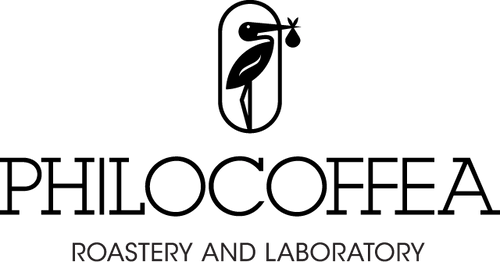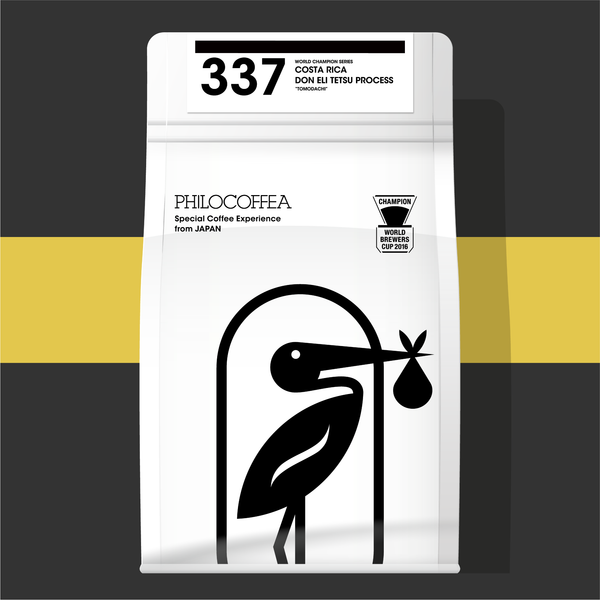Regular price $99.00
Unit price per
Flavor Notes
Cacao Nibs, Dried Cranberries, Plums, Dried Pineapple, Juicy, Molasses, Heavyweight, Complex
Beans
Farm: Don Eli
Producer: Moreno Family
Area: Los Santos
Altitude: 1,800m
Varietal: Catuai
Processing: Tetsu process (Double Anaerobic Honey: Double stage fermentation. First whole cherry fermented for 4 days then Depulp and ferment 3 days in parchment. Finish Honey style.)
Roast Level
Light roast
------------------------------
Thank you for visiting Philocoffea.
The coffee, part of PHILOCOFFEA's signature line "TOMODACHI," is a collaborative creation between a local farm, an exporter from Taiwan (Tri-Up Coffee), and Tetsu Kasuya.
"TOMODACHI" means "Friends" in English. This coffee wouldn't have been created without the connections formed around coffee. It was named with the intention of cherishing these connections.
Through TOMODACHI, we hope that everyone can become friends with the producers, friends with Philocoffea, and friends with fellow coffee enthusiasts.
"Aiming for the World's Best Coffee"
This coffee is the result of a project aiming to create the finest coffee, involving collaboration among a local farm, an exporter from Taiwan (Tri-Up Coffee), and Tetsu Kasuya. It's a special lot made using the refining method <Double Anaerobic Honey>, which Tetsu himself devised and proposed.
This project in Costa Rica is now in its second year. It's not a one-time trial; instead, it involves constant experimentation every year. Philocoffea provides feedback, aiming to eventually create the world's best coffee. To support this endeavor, Philocoffea purchases larger quantities each year and strives to improve the local environment. I believe it's interesting to purchase with the awareness of enjoying the anticipation of continuous improvement year after year.
The Moreno Family has been involved in coffee production in the mountains of Tarrazú, Costa Rica, for three generations. It's a region blessed with volcanic fertile soil, making it a thriving area for the coffee industry. Aimed at sustainable coffee production, the farm is said to cultivate coffee while preserving the environment by minimizing tree cutting.
Currently managing the farm are Carlos, the second generation, and his son Jacob, the third generation. Jacob, with his degree in economics, supports the management of the farm by overseeing processes, lot management, and business aspects. Quite versatile, isn't he? Both grandfather and Carlos have been engaged in coffee cultivation since childhood. The years 2014-2015 marked their debut as specialty coffee producers, where they shifted away from mass production and focused on innovative production methods to enhance quality. Subsequently, they've achieved notable positions in competitions such as 8th place in COE 2021 and 6th place in COE 2022... now established as a prestigious farm in competitions.
In addition to varieties like Catuai, Catura, and Typica, they've recently begun planting new varieties such as Geisha, Bourbon, SL28, and Mundo Novo. They're also experimenting with refining methods, combining traditional techniques with controlling different variables like pH, temperature, and sugar content, introducing anaerobic fermentation processes.
Here are the details of the Kasuya Process:
The "Double Anaerobic Honey Process" is used.
It's a method often used in some specialty coffees lately, the double anaerobic.
In simple terms, it involves conducting anaerobic fermentation twice.
To explain briefly:
1. Only collect fully ripe cherries.
2. Pack the cherries into a sealable tank.
3. Leave the tank submerged in water at a low temperature for 4 days to ferment.
4. Remove the cherries from the tank and process them through a pulper to remove the pulp.
5. Gather the parchment and seal the tank again, without discarding the must (juice accumulated in the tank from the first fermentation).
6. Leave the tank submerged in water at a low temperature for 3 more days to ferment again.
7. Remove the cherries and transition to the honey process, allowing them to dry slowly.
Compared to last year, the initial fermentation period was shortened by one day. As a result, the cacao-like notes have become more subtle, allowing the fruity characteristics to come through more clearly. The TOMODACHI series continues to evolve year by year, gradually shifting toward a cleaner, more refined cup.
You’ll find a gentle fruitiness reminiscent of apple nectar, raisins, and dried orange. A rich sweetness, like almond chocolate, lingers in the finish—adding not only fruity clarity but also depth and complexity. If you had the chance to try last year’s lot, you may notice a brighter, more refreshing impression this time around. The rounded, soft texture remains unchanged, offering the same comforting warmth.
It pairs beautifully with milk, making it a great choice for café au lait or other milk-based drinks at home.
Through this Costa Rican TOMODACHI, we hope you’ll share in the joy of creating truly special coffee together.

